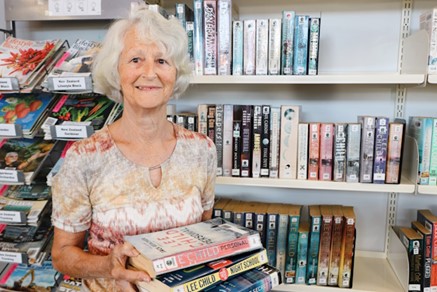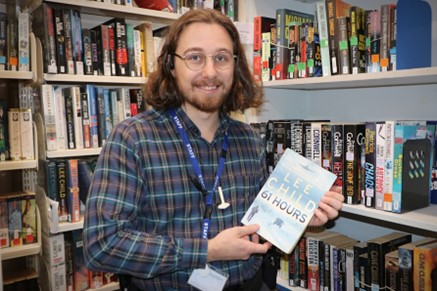23 April 2024
Recognising our librarians
As the guardians of access to books and knowledge, Corrections’ librarians open new worlds to people in prison in an often quiet, but positively powerful, way.
In recognition of World Book Day, meet Northland Region Corrections Facility (NRCF) librarian Sherril and Auckland Prison librarian Jason.

Sherril
Sherril, a qualified librarian, is also co-author of a book on World War I memorials in Petone, ‘Til the Day Breaks (published in 2006). She has been sole-charge librarian at NRCF library since 2013.
“I moved to Kaikohe from Lower Hutt in 2011 and joined NRCF library as a volunteer librarian in 2012. The following year, I was offered a contract role, and two years later, the role became permanent,” shares Sherril.
Since then, she has grown the library into a space catering to the educational, rehabilitation and recreational needs of the men, providing them with a constructive and enjoyable way to spend their time. The key role the library plays in prisoners’ lives shines through feedback, such as, “I didn’t read until I came to prison”, and “I don’t know what I would do if we didn’t have a library”.
Sherril is also on hand to respond to a wide variety of questions and requests. Such as the time when one of the men asked for a Russian dictionary and pronunciation resource.
“The man had a Russian partner and he wanted to brush up on his Russian vocabulary to help his communication with his daughter. I had to go on a bit of a treasure hunt for our dictionary and eventually found it filed among the Chinese books.
“He also needed help with his Russian pronunciation to further improve his proficiency in the language, as the dictionary alone was not enough. Fortunately, I was able to find a pronunciation guide online and downloaded it for him.”
And what do the men at NRCF read?
“Books written by male authors, such as David Gemmell, Raymond Feist, and Lee Child, are in demand by the men at NRCF. Only a few female authors make the cut, including Martina Cole, Hilary Mantel, and Nalini Singh,” says Sherril.
“The most popular genres in our library are thrillers, adventure, Westerns, and suspense. Among the most popular non-fiction books are self-help, personal finance, business, biographies of entertainers, travel, and chess.”
Jason

Auckland Prison Librarian Jason took up his role in June 2023, after completing a master’s degree in history in that same year.
“I was looking for a meaningful job where I could go home each day and feel like I have done something worthwhile and made a difference. Being a prison librarian gives me the fantastic opportunity to experience just that.”
According to Jason, a library can play a transformative role in prison and contribute to the rehabilitation of people in prison by providing vital resources, which can help prisoners on their path towards living a crime-free life.
“We do our best to select books or magazines that would best suit the mens’ requests. Over time, we also get to know their reading preferences and can do a better job of catering to their reading needs,” says Jason.
One of the most requested titles from the prison library is the English dictionary.
“A lot of the men use their time in prison to further their education, and dictionaries play a key role in that,” says Jason.
He explains that prisoners receive books from the library by sending in request forms indicating the genres and subjects in which they are interested, as well as making notes about any favourite authors and themes, or titles.
Books and magazines are delivered by trolley to men in the units in the maximum-prison area, while the low-security satellite units each have their own prison-run library where the men can select books from shelves.
Favourite topics among the men include crime fiction, self-help books, gardening and agriculture, fantasy, history (especially Māori history), and romance, as well as car and women’s magazines.
Popular authors are David Eddings, David Gemmel, Lee Child, Bernard Cornwell, and James Patterson. A popular title is The Secret by Rhonda Byrne.
“Comics are also in demand,” says Jason. “They are great, as they act as a gateway for the men to books and reading.”
In their feedback to the librarians, library users often express their gratitude for the service.
“The men mention how much we help them and give them hope and a more positive outlook on life through access to books. Although this job can sometimes be challenging and stressful, hearing that we’re making a difference in someone’s life makes it all worth it,” says Jason.
Ready to make a move?
Start your journey - check out the a list of our current opportunities then apply online today!